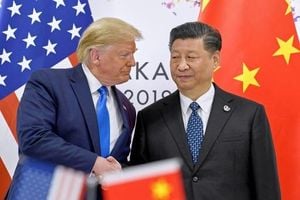Staten Island, long dubbed New York City’s “Forgotten Borough,” has suddenly become the epicenter of a political earthquake shaking the city’s Democratic Party. The tremors began in earnest on September 20, 2025, when Laura LoBianco Sword, chair of Staten Island’s Democratic Party, announced she would step down amid a storm of backlash for her solo endorsement of Zohran Mamdani, the democratic socialist now leading the race for mayor. Her decision, and the controversy swirling around it, have exposed deep rifts in the party and thrust the city’s most conservative borough into the glare of a national spotlight.
For many, the root of the uproar is clear: LoBianco Sword, who also holds a $155,000-a-year post as director of homeowner services in the Mayor’s Office of Housing Recovery, endorsed Mamdani after he stunned the political establishment by defeating former Governor Andrew Cuomo in the June mayoral primary. According to The New York Post, she made this endorsement without the support—or even the knowledge—of her executive committee, a move that some party insiders say violated committee bylaws and left them feeling blindsided.
“She endorsed Mamdani without consultation from the executive board,” said Matt Mobilla, chair of the borough Dems’ law committee and a former state Assembly candidate, in comments to The New York Post. “I was not contacted, I would not have done that. I learned about it from reading the papers, and I am on the executive board!” Mobilla, like many Staten Island Democratic leaders, continues to back Cuomo, who remains in the mayoral race as an independent after losing the primary but winning Staten Island with 46.5% of the vote to Mamdani’s 37.5%.
The timing of LoBianco Sword’s resignation could hardly be more charged. The Staten Island Democratic County Committee is set to vote for new leadership at a reorganization meeting on September 29. In her email to committee members, LoBianco Sword didn’t mention Mamdani or the controversy, instead highlighting her achievements: record fundraising, bylaw reforms, and making the local party “more inclusive” during her nearly three-year tenure. She stated she would “enthusiastically support” Assemblyman Charles Fall to replace her as chair.
But behind the scenes, party operatives say her fate was sealed by the uproar over her endorsement. “Staten Island is not Mamdani Country,” a top borough Democratic operative told The New York Post, arguing that LoBianco Sword’s move to back Mamdani was both unilateral and unnecessary. “It wasn’t like the world was crying out for Staten Island’s endorsement. She went out of her way to do it.”
LoBianco Sword, for her part, has denied being pressured to step down, insisting to The New York Post that she’s “simply not seeking re-election for personal reasons.” She also pushed back on claims that her city job was at risk if Mamdani wins, noting that her position is unionized. “Anyone saying there was no discussion with the executive committee is blatantly wrong,” she said. “But let’s be clear: no decision was needed. The Democratic Party supports the Democratic nominee. That’s our job as county committee — to represent the will of the voters. And the voters were loud and clear.”
Yet the drama on Staten Island is just one front in a broader civil war engulfing New York’s Democrats. At the state level, party leader Jay Jacobs is facing calls to resign—but for the opposite reason. Jacobs has refused to back Mamdani following Governor Kathy Hochul’s surprise endorsement of the far-left candidate, a move that has left the party’s establishment reeling. According to The New York Post, Jacobs’ resistance to far-left politics is seen as a stand against the party’s recent losses in suburban Nassau County, where support has been hemorrhaging.
Meanwhile, Mamdani’s meteoric rise has sent shockwaves through the city’s political and business elite. As The New York Times reported on September 21, Mamdani, 33, has built a formidable base among young, high-earning professionals—Gen Z and Millennial white-collar workers who, despite earning well above the city’s median household income of $81,000, feel squeezed by an affordability crisis. In the June primary, Mamdani won a staggering 67% of the vote in wealthy precincts where the median income is at least $200,000 and the median age is 45 or under, including trendy enclaves like Park Slope, Williamsburg, and Manhattan’s Financial District. In older, affluent neighborhoods like the Upper East and Upper West Sides, his share dropped to 45%—still significant, but revealing a generational divide.
“For a lot of people in my generation there’s a doomsday-ism,” said Sophie Wang, a 26-year-old data analyst earning $150,000 a year, in an interview with The New York Times. “But the antidote for her anxiety, Ms. Wang said, is Mr. Mamdani, who has promised free buses, a freeze on rents on stabilized apartments, and 200,000 new affordable housing units.” Wang’s comments echo those of other young professionals who see Mamdani as both a symbol of hope and a champion for a city they fear is slipping out of reach.
Jessica Jin, a 34-year-old marketer, told The New York Times that Mamdani’s commitment to affordable child care and keeping New Yorkers of all backgrounds in the city resonates deeply with her. “Being able to keep people who are not just like me here means that it’s a richer place to stay,” Jin said. “My bare minimum goal in life is to be able to provide for my future family the way that my immigrant parents did.”
Even those who admit they’re less affected by the city’s affordability crisis, like Sage Arik Mason, a 28-year-old associate lawyer earning $225,000, say Mamdani’s policies are “thrilling” because they promise a stronger social safety net for all. “You shouldn’t have to be a doctor, a lawyer or an investment banker to survive in New York,” Mason told The New York Times.
Not everyone is convinced, of course. Business leaders have tried to paint Mamdani as too extreme for New York, and some worry that his plans to finance sweeping reforms through higher taxes on corporations and the top 1% will drive wealth and jobs out of the city. Yet, according to The New York Times, the enthusiasm for Mamdani is particularly pronounced in the tech sector, with more Google employees donating to his campaign than to any other candidate.
Mamdani’s primary victory and his surging campaign have become a focal point for progressive hopes and anxieties alike. As discussed on The Red Thread Pod on September 20, his win is seen as a rejection of former Mayor Eric Adams’ pro-cop administration, the influence of the Zionist lobby, and Andrew Cuomo’s multi-million-dollar campaign against him. The podcast hosts highlighted how Mamdani’s campaign reflects a broader discontent with the Democratic Party establishment—and, paradoxically, is also working to rebuild the very party responsible for policies like ICE funding and neoliberal austerity.
The implications are historic. As New Statesman noted on September 19, Mamdani, born in Uganda and raised in Manhattan, would become the highest-ranking avowed socialist to hold office in U.S. politics if he wins in November. His viral social media presence and progressive platform have energized a coalition of young, diverse, and often affluent voters, while also exposing the limits and contradictions of reformist strategies within the Democratic Party.
As the city heads toward a pivotal election, the battle lines within the Democratic Party—and the future direction of New York itself—remain sharply drawn. Staten Island’s drama may be just one chapter, but it’s a telling one, revealing the high stakes and deep divisions that define this moment in American politics.






